|
|
|
Sort Order |
|
|
|
Items / Page
|
|
|
|
|
|
|
| Srl | Item |
| 1 |
ID:
143906
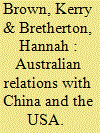

|
|
|
|
|
| Summary/Abstract |
Australia seems to have condemned itself to a template of its relations with the USA and China where security assurances reside with the former and economic with the latter. But this veneer of stability is misleading. Over the last decade, successive Australian prime ministers have ranged from describing China as a ‘true friend’ (Rudd in 2008) to one towards whom it feels ‘fear and greed’ (Abbott in 2014). This range betrays a policy void where the dominant Australian psyche is plagued by a perceived lack of power and fatalism. Policy towards China has become the victim of shifting ephemeral political trends driven by volatile emotions rather than a stronger, more level-headed long-term strategic vision.
|
|
|
|
|
|
|
|
|
|
|
|
|
|
|
|
| 2 |
ID:
143910
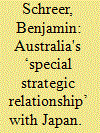

|
|
|
|
|
| Summary/Abstract |
In July 2014, Australia's new Prime Minister, Tony Abbott, and his Japanese counterpart, Shinzō Abe, elevated the status of bilateral ties to a ‘special strategic relationship'. Both sides also agreed on intensifying their defence technology cooperation, including in the submarine space. As well, Prime Minister Abbott called Australia a ‘strong ally’ of Japan. Yet, the prospect of a further strengthening of Australia–Japan defence relations has led to criticism by Australian strategic commentators. In particular, critics argue that closer strategic relations with Japan could damage Australia's ties with a rising China. In a worst-case scenario, Australia might even become ‘entrapped’ in a Sino-Japanese conflict. However, this argues that a closer defence relationship is in Australia's strategic interests in the face of China's increasing challenge to the rules-based order in the region. China's uncompromising position in the South China Sea and its more assertive behaviour have led to a greater congruence of threat and risk assessment between Australia and Japan. Indeed, Australia and Japan are increasingly facing a security dilemma vis-à-vis China, albeit to varying degrees. Therefore, for Australia, promoting Japan's ‘security normalisation’ contributes to regional stability. As well, the article points out that closer strategic ties with Japan do not automatically come at the expense of Sino-Australia relations. China's leverage to ‘punish’ Australia for unwanted strategic behaviour is limited, and concerns about ‘entrapment’ in a Sino-Japanese war are exaggerated. However, the more China exerts coercive diplomacy, the closer Australia–Japan defence relations are likely to become.
|
|
|
|
|
|
|
|
|
|
|
|
|
|
|
|
| 3 |
ID:
143913
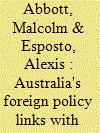

|
|
|
|
|
| Summary/Abstract |
In more recent years, Australia's relations with the countries of Latin America have taken on more importance as the trade and investment links between the two regions have grown. Besides this recent activity, Australia has a long history of diplomatic relations with the countries of Latin America, even though the links between the two regions have at times been fairly superficial. This relationship, like many others, has tended to concentrate on mainly trade relations and, despite Latin America's often turbulent political history, has not been affected much at all by political issues. The purpose of this article is to analyse the development of foreign policy links between Australia and the countries of Latin America in their formulative stage between 1901 and 1973.
|
|
|
|
|
|
|
|
|
|
|
|
|
|
|
|
| 4 |
ID:
143908
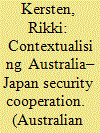

|
|
|
|
|
| Summary/Abstract |
On July 1, 2014, Prime Minister Shinzō Abe's cabinet commenced a historic transformation of post-war Japan's security policy by overturning previous interpretations of the constitution's pacifist clause, Article 9. The Cabinet Decision on the Development of Seamless Security Legislation to Ensure Japan's Survival and Protect Its People stated that collective self-defence was consistent with the constitution and, consequently, Japan would immediately develop a more proactive and less constrained security policy. But while this outcome may seem sensible and overdue from a realist perspective of Japan's standing as a mature democratic nation in an increasingly difficult geopolitical situation, the manner in which it is being enacted may seriously undermine the normative legitimacy of Japan's new security identity. In this article, the author examines how Shinzō Abe's administration has attempted to shape the norms surrounding security policy revision in Japan, and how these norms, in turn, have affected or constrained Abe's agency. This is done with specific reference to the external contexts of the USA's ‘rebalance’ policy and the deepening of Japan's security relationship with Australia, with a view to anticipating how normative turmoil might impact on the potential of this relationship.
|
|
|
|
|
|
|
|
|
|
|
|
|
|
|
|
| 5 |
ID:
143912


|
|
|
|
|
| Summary/Abstract |
This article deconstructs United Nations Security Council (UNSC) Resolution 2094 through the preambulatory statements, objectives, obligations, and implementation and enforcement provisions of UNSC Resolution 2094. The article proceeds in three parts. First, it reviews the academic literature on UNSC sanctions and their application in the North Korean case. Second, it deconstructs UNSC Resolution 2094 according to the common structural components of international legal instruments to assess the level of congruence between the objectives of UNSC Resolution 2094, its enforcement mechanisms and outcomes. Third, it explores the weaknesses of UNSC Resolution 2094, focusing on the gap between the objectives and enforcement mechanisms found in the resolution. The inability of the UNSC sanctions regime to prevent North Korea reaching the cusp of becoming a nuclear weapons power is evidence of the international community's weak leverage over Pyongyang, a situation arising from the vulnerability of South Korea to a North Korean attack and the cross-cutting strategic priorities of China; the absence of economic linkages between the Democratic People's Republic of Korea and the primary sanctions-sender state in the USA; and North Korea's commitment to a nuclear weapons capability as the foundation of its medium-term economic development strategy, its institutional governance structure and associated ideological commitments.
|
|
|
|
|
|
|
|
|
|
|
|
|
|
|
|
| 6 |
ID:
143915


|
|
|
|
|
| Summary/Abstract |
On taking office in late 2013, the incoming Abbott government proclaimed the advent of a new aid paradigm. This article asks whether or not this is the case. It does so by situating the new coalition policy in the context of more than two decades of development thinking. Focusing on the way Australian aid policy reflects trends in both global development and geopolitical discourses, the article parses out continuity and change. It finds that Australia's new aid paradigm is in fact largely the old aid paradigm reincarnate, with aid policy continuing to follow the well-established parameters outlined over decades of global thinking and practice that emphasise the significance of private-sector-led economic growth. However, while the overarching paradigm remains relatively intact, incremental change is also apparent, including alterations to the geographic focus, level and administration of the program.
|
|
|
|
|
|
|
|
|
|
|
|
|
|
|
|
| 7 |
ID:
143909
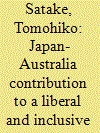

|
|
|
|
|
| Summary/Abstract |
This article discusses how Japan and Australia could contribute to a liberal and inclusive order in the Asia-Pacific region. Critics argue that closer ties between Japan and Australia could undermine the stability of regional security, dividing Asia into ‘mutually hostile armed blocs’ consisting of US allies and China. Contrary to such a view, this article argues that deepening and enhancing Japan–Australia security cooperation could, if carefully managed, help to maintain an inclusive regional order based on institutions, norms and values, as well as a stable balance of power relations. In particular, the article contends that Japan and Australia can contribute to regional order by strengthening their ‘middle-power cooperation’ through regional capacity-building, institution-building, rule-making or norm-setting, and coalition-building, while supporting the US military presence in the region. It then concludes that, despite differing attitudes towards Beijing, Tokyo and Canberra can further contribute to the longevity of the current regional order by inclusive institutional architecture and liberal norms and values.
|
|
|
|
|
|
|
|
|
|
|
|
|
|
|
|
|
|
|
|
|